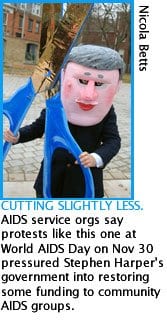AIDS service organizations in Ontario will receive an increase in federal funding over the next two years, but will still fall well short of previously promised amounts.
According to the Ontario AIDS Network (OAN) the federal government will provide $4,023,000 in each of the 2009-10 and 2010-11 fiscal years to AIDS service organizations (ASOs) under the national AIDS Community Action Program. Funding for this current year will remain at $2,457,000, the same as last year when funding to Ontario was cut by more than a million dollars.
According to OAN the funding for this year under a national AIDS plan implemented in 2006 should have been $4,556,000. For 2009-10 and 2010-11 funding should have been 11.7 percent higher in each year.
“In my view we have made significant progress but we continue to remain long on promises but short on delivery,” OAN executive director Rick Kennedy wrote in an e-mail from the International AIDS Conference in Mexico City.
Existing programs that already receive federal funding can apply to continue to do so, and will able to receive $5,000 more a year. ASOs can also apply for funding for additional programs.
Kennedy thinks the announced funding is the result of political pressure being applied to the government.
“I believe the progress that has been made so far was the result of media interest, particularly the in-depth reporting from Xtra, the postcard campaign and the continued efforts of our supporters and ASOs in keeping this issue alive,” wrote Kennedy.
Le-Ann Dolan, the director of programs and services for the AIDS Committee of Toronto (ACT), agrees that the funding would not have come without pressure and protests.
“That’s certainly the result of the public speaking to our federal government and in our land of democracy, I would hope that continues to be the case,” she says.
Dolan says she would also have liked to see funding announced beyond two years.
“Does that make me nervous? Yes,” she says. “Would I like to see a longer-term announcement? Sure.”
But Dolan says the funding will allow ACT to continue and expand a number of existing programs including outreach to the Portuguese community and several programs aimed at youth, including Positive Youth Outreach.
“Now we can build deeper and deeper relationships with youth, go out and do education and also build programs that youth can run themselves,” says Dolan.
Dolan says ACT is thinking about new programs it could develop with the funding.
“Two other areas where we’re really seeing an increase in our clients are people who are experiencing addiction issues and people who are experiencing mental health issues,” she says.
But Dolan says ACT is constrained by the government’s refusal to fund programs such as safe injection sites and other harm-reduction projects. Health Minister Tony Clement told the recent Mexico City conference the government opposed Vancouver’s Insite safe injection facility.
“There’s no longer any funding for harm reduction, unless there’s a change in approach from the health minister,” says Dolan. “If Clement is describing this internationally our hopes for that changing are pretty dismal.
“We would like to do work with aboriginal communities, sex workers, some of the groups that don’t have equal access to programs. But there’s a lot of uncertainty based on government stances on many of our programs.”
In other parts of the country that uncertainty also extends to funding itself. ASOs in Alberta say they have not been told how much money they will be receiving beyond this year.
According to Debra Jakubec, the chair of the Alberta Community Council on HIV and the executive director of HIV Edmonton, groups in the province have only just been told that this year’s funding has been cut.
Jakubec says funding for this year has been cut from $905,000 to $847,000.
“We knew it was coming for a while and it’s finally come.”
Jakubec says the cuts will be felt especially hard in a province where the population is exploding.
“With the boom in the province any funding cut is disastrous,” she says. “In Edmonton I’ll lose about $13,000 and Edmonton is currently in the middle of a syphilis epidemic. But in Edmonton I’ll be able to do some fundraising.
“Smaller organizations, they’re on such tight budgets. For some organizations in Alberta they’ll be cutting back their outreach and prevention programs. That translates into 10,000 fewer condoms in boomtown Fort McMurray. It just makes you worry that there’s a public health crisis looming.”
Jakubec doesn’t expect that federal funding in Alberta will increase at all next year.
“As of Jul 21 they didn’t have a number for us,” she says. “but I assume the number will remain the same.”


 Why you can trust Xtra
Why you can trust Xtra


